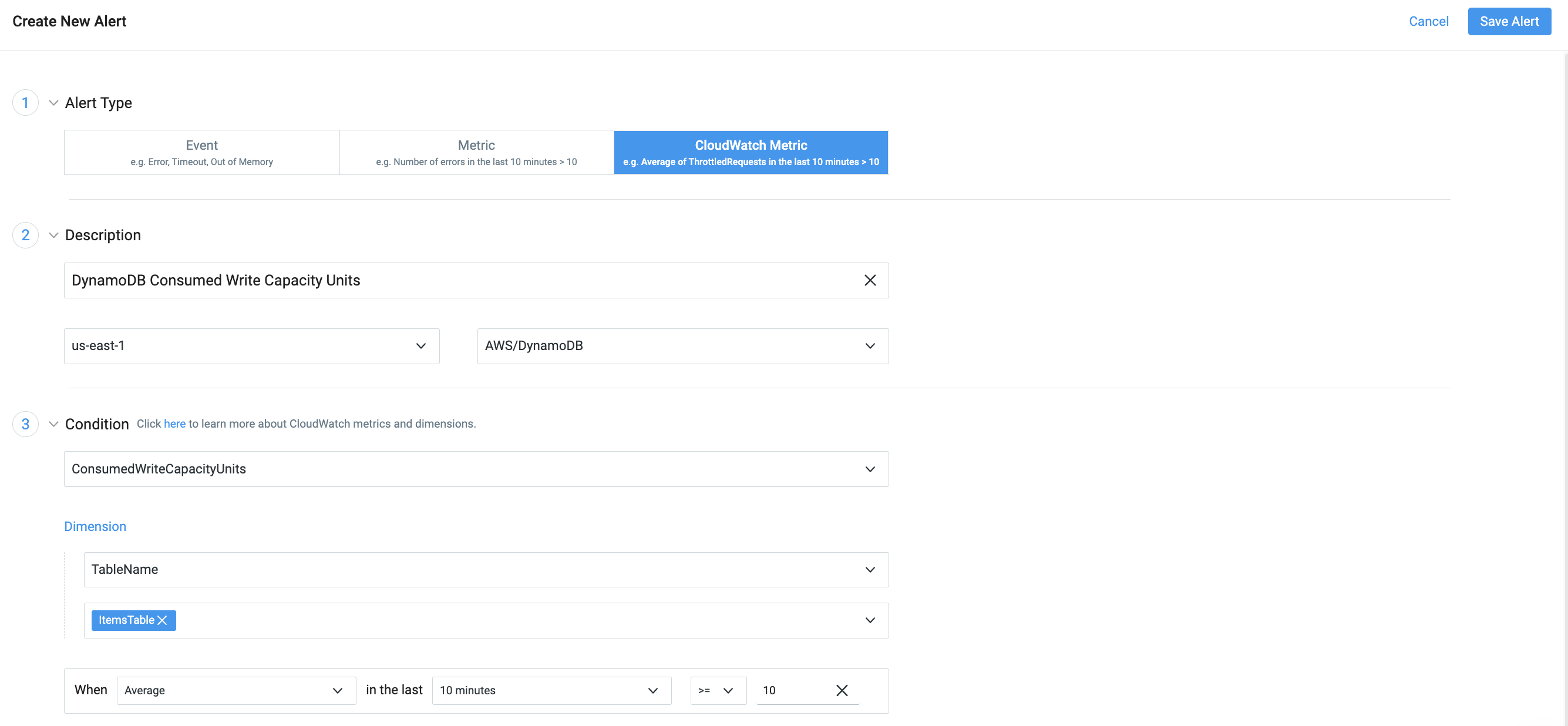CloudWatch Metric Alerts
Overview
CloudWatch Metric alerts are triggered when a CloudWatch Metric exceeds a threshold during a period of time. An example is a CloudWatch Metric alert triggered when the number of messages added to an SQS queue exceeds 10 in the last 10 minutes.
The alert type is displayed below the alert name on the Alerts page.

To create an event alert:
- Navigate to Alerts and select Create New Alert.
- Select CloudWatch Metric as the type of alert you want to create.
- Name the alert in the Description box and select the region and namespace that the alert applies to.
- Specify the Condition that will trigger the alert.
- Select the Dimension and CloudWatch metrics to which the alert applies.
- Set the condition values in the When box.
- Click Save

Lumigo creates the corresponding alarms in CloudWatch when the alert is saved.
NoteEnsure your IAM role includes the following or go to Settings > AWS and update to the latest IAM role.
"Effect" : "Allow", "Action": [ "cloudwatch:PutMetricAlarm", "cloudwatch:DeleteAlarms", ], "Resources": "*" }
About CloudWatch metrics and alarmsAmazon CloudWatch is a monitoring service that provides metrics and actionable insights to monitor applications, respond to system-wide performance changes, and optimize resource utilization.
Further reading
Importing CloudWatch Alarms
Overview
CloudWatch Metric Alarms are triggered when a CloudWatch Metric exceeds a threshold during a period of time. An example is a CloudWatch Metric Alarm triggered when the number of messages added to an SQS queue exceeds 10 in the last 10 minutes.
Import existing CloudWatch alarms
CloudWatch alarms can be imported to Lumigo by adding to your alarm configuration any of the following:
- AWS tag:
lumigo_alert:true - Substring in your alarm description:
[lumigo_alert:true]
Set notifications
You can configure Lumigo as the notification service for your imported CloudWatch Alarm by adding AWS Tags or updating the Alarm description:
-
Configuring notifications using AWS tags:
- Set notification service
- Slack:
lumigo_alert_slack:channel_name - Email:
lumigo_alert_email:address - PagerDuty:
lumigo_alert_pagerduty:""
- Slack:
- Set notification frequency:
lumigo_alert_frequency:Every event/1h/4h/12h/24h
- Set notification service
-
Configuring notifications in the CloudWatch Alarm description:
- Set notifications service:
- Slack notifications:
[lumigo_alert_slack: channel1, channel2] - Email notifications:
[lumigo_alert_slack: address1, address2] - PagerDuty:
[lumigo_alert_pagerDuty]
- Slack notifications:
- Set notification frequency:
[lumigo_alert_frequency: Every event/1h/4h/12h/24h] - Supported notification channels:
- Slack
- PagerDuty
- Microsoft Teams
- VictorOps
- OpsGenie
- Set notifications service:
NoteAlarms that were imported to Lumigo are in read-only mode, and can be updated or deleted only through AWS.
Delete imported CloudWatch Alarm
Deleting an imported CloudWatch Alarm can be done via any of the following:
- Remove the AWS tag
lumigo_alert:true - Remove
[lumigo_alert:true]from your alarm description
NoteLumigo scans CloudWatch for updates every 10 minutes.
Learn more
Create Event Alert
Create alerts that keep you informed about errors and exceptions.
Create Metric Alert
Create alerts that keep you informed about performance issues.
Notifications
Learn about the types of notifications and how to manage them.
Updated 6 months ago